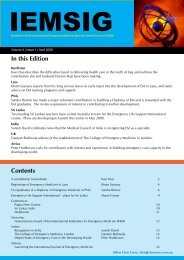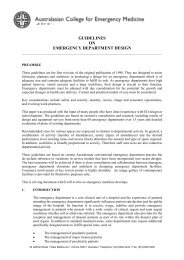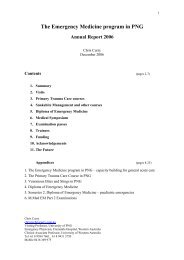Create successful ePaper yourself
Turn your PDF publications into a flip-book with our unique Google optimized e-Paper software.
COUNCIL COMMITTEE<br />
REPORTS<br />
Constitution and<br />
Regulations Committee<br />
During the past year, the Committee<br />
has reviewed faculty regulations and<br />
special interest group regulations,<br />
along with regulations relating to<br />
the Board of Education and the<br />
non-specialist training program, the<br />
minimum paediatric requirement and<br />
the interruption of training.<br />
Special Considerations and<br />
Discretionary Powers of Board of<br />
Education policies have been added,<br />
along with a new regulation for<br />
establishment of a Gift Fund.<br />
Internal and external communication<br />
processes have been reviewed.<br />
To fully establish the role of Deputy<br />
Censor-in-Chief, a number of<br />
clauses of the Constitution and the<br />
Regulations have been amended.<br />
Regulations relating to quorums<br />
for committees and subcommittees<br />
as well as voting rights for trainee<br />
representatives on Council<br />
committees have been clarifi ed.<br />
The structure and numbering of<br />
the Regulations are currently being<br />
reviewed.<br />
A draft proposal for review of the<br />
Terms of Reference is to be forwarded<br />
to Council Executive for consideration<br />
and advice, with a view to updating<br />
the role of the Constitution and<br />
Regulations Committee.<br />
I am indebted to Liv Cameron and the<br />
other Committee members for their<br />
continuing support and advice.<br />
Alan Tankel, Chair<br />
Private Practice<br />
Committee<br />
In the previous 12 months, there have<br />
been signifi cant developments within<br />
the Private Practice Committee.<br />
Yusuf Nagree ended his tenure as<br />
Chair of the Committee. Kate Porges<br />
and Greg McDonald were elected as<br />
co-chairs, with Kate Porges remaining<br />
the Council representative.<br />
Other new members include Aled<br />
Williams, Pankaj Arora, Pip Wills and<br />
Michael Ben-Meir.<br />
A major funding stream became<br />
available through the federal<br />
Department of Health and Ageing<br />
(DOHA) to enhance supervision<br />
of trainees in private emergency<br />
departments, including registrars<br />
and career medical offi cers. Several<br />
departments made successful<br />
applications for this funding, most<br />
receiving between $1-2 million over<br />
three years. This will allow the<br />
appointment of emergency physician<br />
supervisors of training, as well as<br />
infrastructure and clerical/support<br />
staff.<br />
In conjunction with this program, the<br />
College and DOHA have negotiated<br />
additional funded registrar positions<br />
in private emergency departments<br />
under the Specialist Training Program.<br />
Those emergency departments who<br />
successfully received funding for<br />
enhanced supervision have committed<br />
to increasing the number of<br />
emergency medicine training positions<br />
within their departments or their<br />
hospitals.<br />
The problem with adequate<br />
remuneration of private emergency<br />
physicians and the fl awed funding<br />
model for private emergency<br />
departments continues. Put simply,<br />
private emergency departments<br />
cannot be self-funding under the<br />
current fi nancial model and require<br />
signifi cant out-of-pocket expenses<br />
for patients and cross subsidies from<br />
the parent hospital. The Committee<br />
has considered ways of enhancing<br />
emergency physician remuneration<br />
and will discuss these with the College<br />
and present them to DOHA in the<br />
next 12 months.<br />
There are also some anomalies<br />
regarding the Medicare reimbursement<br />
rates for trainee emergency physicians<br />
in private departments. Again, the<br />
Committee will negotiate these<br />
anomalies with DOHA.<br />
It has been noted that knowledge<br />
of the general scope and activities<br />
of private emergency departments<br />
throughout Australia is not adequate.<br />
The Committee will survey all private<br />
emergency departments so that it can<br />
know more about their activities and<br />
better advocate for private emergency<br />
medicine.<br />
Other issues considered by the<br />
Committee are: private practice<br />
emergency department role<br />
delineation; accreditation standards;<br />
and establishing a Moodle page on the<br />
College website for private emergency<br />
physicians.<br />
The Committee thanks Corinne<br />
Millane for her contribution as<br />
Committee administrator, and<br />
welcomes Bec McPhee as its new<br />
administrator.<br />
Greg McDonald, Chair<br />
Public Health<br />
Committee<br />
Many Fellows and trainees may be<br />
unaware of the role and actions of<br />
the Public Health Committee (PHC)<br />
and uncertain of why a college for<br />
emergency medicine even has one.<br />
It may seem far from important to<br />
busy emergency doctors just trying<br />
to do their best for their patients.<br />
The challenges that face us may risk<br />
us becoming inwardly focused, with<br />
almost a siege mentality. The curious<br />
emergency physician may ask: why<br />
do I keep seeing the same types of<br />
injury or illness? Why am I working in<br />
<strong>ACEM</strong> <strong>Annual</strong> <strong>Report</strong> <strong>2011</strong><br />
21






